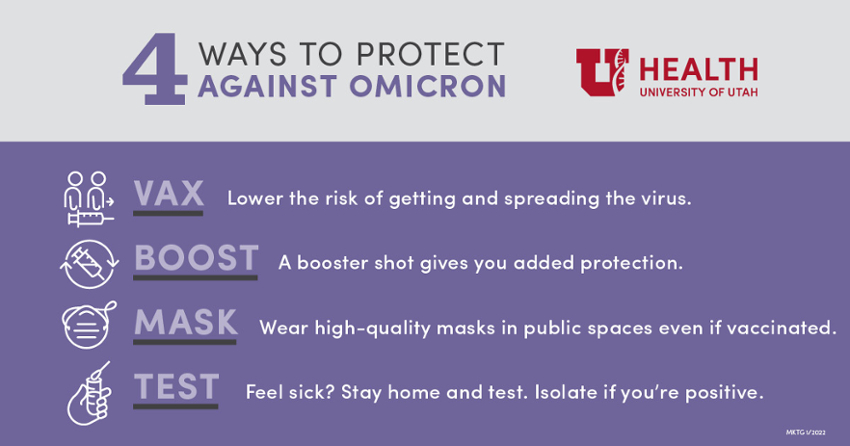This information was accurate at the time of publication. Due to the changing nature of the COVID-19 pandemic, some information may have changed since the original publication date.
One thing the pandemic has taught us is that change is constant. As COVID-19 evolves, our response needs to change, too. Omicron has overtaken Delta as the dominant virus variant, causing an unprecedented surge in cases. Case counts in the U.S. have hit record highs and are predicted to worsen in the coming weeks.
With that in mind, it's time to take care of ourselves and one another by re-engaging the tried-and-true tools that we know work: vaccinate, boost, mask, and test (read more on each below). Here's why.
Omicron is different
This variant is highly contagious and able to infect people who had COVID-19 previously or were vaccinated several months ago (or longer). That's why so many people are getting infected and why getting a booster dose is so important. Emerging evidence also indicates that a typical case of Omicron has a lower chance of causing serious illness. However, now is not the time to be complacent.
Omicron still sends people to the hospital, and risking infection is not worth the gamble. People who are unvaccinated (including young children), immunocompromised, older adults, and people with certain medical conditions are at higher risk. But it's not understood who else is susceptible. Protecting yourself is one reason to take added precautions with Omicron. Another is to protect the vulnerable people around you.
COVID-19 treatments are scarce
Compounding the issue, treatments that prevent serious illness have become harder to come by. Monoclonal antibody therapies and antiviral pills that combat this variant are in extremely short supply. And just as more people need medical care, hospitals across the country are becoming short staffed. As a result of all these things together, some health systems are overwhelmed, making it difficult for them to provide care for any condition, whether it's COVID-19, heart failure, or a traumatic injury. Now is not the time to fall ill with COVID-19, or to pass it on to someone else.
Here is what you can do

Vaccinate
- If you haven't yet, now is the time. Everyone ages 5 and older should get vaccinated.
- COVID-19 vaccines help protect against Omicron, slow the spread, and reduce the likelihood of new variants emerging. Unlike COVID-19 treatments, there is plenty of vaccine.
- People who have had COVID-19 can become reinfected with Omicron. Get vaccinated even if you've had COVID-19. Vaccination and a booster provide better protection than natural immunity.
- Emerging evidence indicates that illness caused by breakthrough infections in vaccinated people is typically milder than COVID-19 in unvaccinated people.
Boost
- A booster dose substantially increases protection against Omicron.
- It's recommended that everyone ages 12 and older who is eligible get a booster.
Mask
- Wear a mask in indoor public spaces, even if you're vaccinated, and avoid large crowds when possible.
- Well-fitting surgical masks, KN95s, or N95s protect better than cloth masks.
Test
- Stay home and get tested if you feel sick.
- If you're infected, it can take time to build up enough virus for a test to detect. If you have COVID-19, it may take a few days to test positive after the onset of symptoms. If you're exposed, wait five days before testing.
- PCR tests are more accurate, but antigen tests, including at-home tests, give results faster.
- If using an at-home test, test more than once over the course of a few days especially if symptoms persist or worsen.
- If you test positive or have been exposed, see Centers for Disease Control guidelines for what to do next.
Go to vaccines.gov to find a vaccine provider near you.